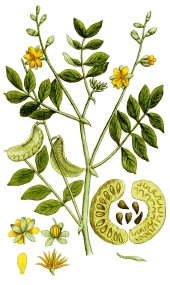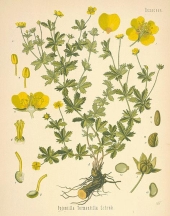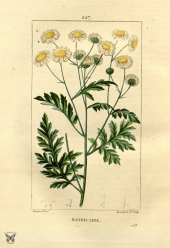Valerian, Sedative, Stinky, Storied and More!
https://southernappalachianherbs.blogspot.com/2021/03/valerian-sedative-stinky-storied-and.html

Valerian has long been one of my favorite herbs, but I put off writing this one for a while due to massive amount of research I have collected. It was one of the first I learned to identify in the wild - any doubt of whether or not I had picked the right plant could be solved by smelling the root. Some say it smells like dirty socks, and the ancient Greek herbalists are said to have referred to it as “Phu”, which is the same in meaning as our modern term for offensive smells, “pew”. People say you cannot smell valerian without digging it up, but I can attest that after a rain on a hot, summer day in the Blue Ridge Mountains, a sensitive nose can sniff it out. I use Valerian frequently, and have for years.. My main health complaints are sciatica, pain from tight, knotted back and neck muscles, sleeplessness and allergic asthma. Valerian relaxes the muscles, is sedative and relaxes the bronchioles. I am also a very calm natured, “laid back” type of person, so Valerian suits me.
Hippocrates and Galen are said to have recommended Valerian for insomnia, though as of this writing, I have been unable to find the exact quotes in their work. Dioscorides, however, wrote extensively on Valerian, which he called, “Nard”, “Phu” and “Fuchs”, one variety of which, he compared to the scent of goat. His recommended uses were quite different that we usually would think of in regard to this herb, “Applied they stop discharges of the womb and the whites [leucorrhoea, a mucosal vaginal discharge]. A decoction (taken as a drink with cold water) helps nausea and stomach rosiones [gnawing corrosion], those troubled with wind, sickness of the liver or head, and painful kidneys. Boiled in water and given either as a warm pack or hip bath they heal inflammation of the vulva.” He mentions a Celtic Valerian that, “ Taken as a drink with a decoction of wormwood it helps inflammation of the liver, jaundice, and gas-filled intestines. In the same way it is good for the spleen, bladder and kidneys, as well as mixed with wine for bites of venomous creatures.”
Interestingly, he also discusses wines made of Valerian, which must be quite relaxing!
Wine from Syrian nard, Celtic nard and malabathrum is made as follows. Take half a pound of each, put them into two gallons of must, and after two months strain it out. Give one winecupful of this to three of water. It is good for kidney disorders, liver ailments, dysuria, jaundice, poor colouring and gastritis. Some put one or two ounces of acorus and three ounces of Celtic nard into nine gallons of must.
The herbal use of Valerian seems to have been more popular among European herbalists. In the Middle Ages, Saint Hildegard von Bingen wrote, “One who suffers from pleurisy, or is in pain from the gitcht, should pulverize valerian and add a bit less catnip powder. He should mix flour and water in a small dish with lard and these herbs, making little cakes. He should eat them often. The pleurisy or gicht in him will cease and he will be better.”
Gitcht, by the way, seems to refer to inflammatory swellings and stiffness, that could range from arthritis and rheumatism to paralysis, swollen joints or withering of muscles…. What the old-timers in the American south used to call , being, “all stoved up”.
Fr. Kneipp wrote in My Water Cure, “The innate strength of valerian is proved to us by its effect upon cats, which it stupefies to the extent of causing them to roll in it. We make use of the root only, which, chopped up and infused as tea, or ground to powder, may be taken in small doses. Valerian root has much the same effect as rue in relieving headache and cramp-like complaint, by expelling unwholesome gasses.”
The effect of Valerian on cats is much like Catnip or Catmint, but often stronger. Rats are also said to be attracted to the scent of Valerian. This quality of the herb is said to have been used by the “Pied Piper” to lure plague-carrying rats out of the village of Hamelin. Other folk uses include being used in medieval Sweden to “ward off the envy of elves.”
In British herbalism, we find Valerian even being referred to as “all-heal” and more commonly, “set-well” or “set-wall”, all names meaning that it resources one to health. Gerar lists seven varieties of Valerian, and gives their use as:
[i]The dry root, as Dioscorides teacheth, provoketh urine, bringeth down the desired sickness, helpeth the pain in the sides, and is put into counterpoisons and medicines preservative against the pestilence, as are treacles, mithridates, and such like: whereupon it hath been had (and is to this day among the poor people of our Northern parts) in such veneration amongst them, that no broths, pottage, or physical meats are worth anything, if Setwall were not at an end: whereupon some woman poet or other hath made these verses;
They that will have their heal;
Must put Setwall in their keel.
B. It is used generally in slight cuts, wounds, and small hurts.
C. The extraction of the roots given, is a most singular medicine against the difficulty of making water, and the yellow Jaundice.
D. Wild Valerian is thought of the later herbarists to be good for them that are bursten, for such as be troubled with the cramp and other convulsions, and also for all those that are bruised with falls.
E. The leaves of these and also those of the garden, are good against ulcers and soreness of the mouth and gums, if the decoction thereof be gargarized or held in the mouth.
F. Some hold opinion that the roots of wild Valerian dried and powdered, and a dram weight thereof taken with wine, do purge upward and downward.[/i]
Culpepper wrote of the Wild Valerian, “The roots of Valerian have a strong, and, to most people, a disagreeable smell; to the taste they are warm bitter, and a little acrid. There is no doubt but it possesses antispasmodic virtues in a very eminent degree. It is often given the advantage in hysterical cases; and there are instances of its having effecte cures in obstinate epileptic cases. In habitual constiveness it is an excellent medicine, and will frequently loosen the bowels, when other purgatives have proved ineffectual. It is excellent against nervous affections in general such as inveterate head-achs, trembling, palpitations of the heart, vapours, and hysteria complaints.”
Of the Garden Valerian, he states:
This is under the influence of Mercury. Dioscorides saith, That the Garden Valerian has a warming faculty, and that being dried and given to drink it provokes urine, and helps the stranguary. The decoction thereof taken, doth the like also, and takes away pains of the sides, provokes women's courses, and is used in antidotes. Pliny saith, That the powder of the root given in drink, or the decoction thereof taken, helps all stoppings and stranglings in any part of the body, whether they proceed of pains in the chest or sides, and takes them away. The root of Valerian boiled with liquorice, raisins, and anniseed, is singularly good for those that are short-winded, and for those that are troubled with the cough, and helps to open the passages, and to expectorate phlegm easily. It is given to those that are bitten or stung by any venomous creature, being boiled in wine. It is of a special virtue against the plague, the decoction thereof being drank, and the root being used to smell to. It helps to expel the wind in the belly. The green herb with the root taken fresh, being bruised and applied to the head, takes away the pains and prickings there, stays rheum and thin distillation, and being boiled in white wine, and a drop thereof put into the eyes, takes away the dimness of the sight, or any pin or web therein. It is of excellent property to heal any inward sores or wounds, and also for outward hurts or wounds, and drawing away splinters or thorns out of the flesh.
Mrs. Grieves in her great summation of British herbal knowledge, A Modern Herbal, written in 1935 tells us much about Valerian:
Valerian is a powerful nervine, stimulant, carminative and antispasmodic.
It has a remarkable influence on the cerebro-spinal system, and is used as a sedative to the higher nerve centres in conditions ofnervous unrest, St. Vitus's dance, hypochrondriasis, neuralgic pains and the like.
The drug allays pain and promotes sleep. It is of especial use and benefit to those suffering from nervous overstrain, as it possesses none of the after-effects produced by narcotics.
During the recent War, when air-raids were a serious strain on the overwrought nerves of civilian men and women, Valerian, prescribed with other simple ingredients, taken in a single dose, or repeated according to the need, proved wonderfully efficacious, preventing or minimizing serious results.
Though in ordinary doses, it exerts an influence quieting and soothing in its nature upon the brain and nervous system, large doses, too often repeated, have a tendency to produce pain in the head, heaviness and stupor.
It is commonly administered as Tinctura Valerianae Ammoniata, and often in association with the alkali bromides, and is sometimes given in combination with quinine, the tonic powers of which it appreciably increases.
Oil of Valerian is employed to a considerable extent on the Continent as a popular remedy for cholera, in the form of cholera drops, and also to a certain extent in soap perfumery.
Ettmuller writes of its virtues in strengthening the eyesight, especially when this is weakened by want of energy in the optic nerve.
The juice of the fresh root, under the name of Energetene of Valerian, has of late been recommended as more certain in its effects, and of value as a narcotic in insomnia, and as an anti-convulsant in epilepsy. Having also some slight influence upon the circulation, slowing the heart and increasing its force, it has been used in the treatment of cardiac palpitations.
Valerian was first brought to notice as a specific for epilepsy by Fabius Calumna in 1592, he having cured himself of the disease with it.
Valerian is often used among modern herbalists. The late herbalist, Michael Moore described it as a “simple sedative” and , “the most powerful simple sedative we have.” He said that in addition to being used for nervousness, high blood pressure and sleep, in cases of intense pulsing pain… such as a broken bone, Valerian could be used to induce an sleep and rest. Essentially he said, enough of it will knock a person out. That said, Valerian is not useful to everyone as a sleep aid, because it can cause intense, sometimes nightmarish dreams. It tends to bring up bad memories in the subconscious in some of us. He also warned that, with prolonged use, it can cause certain people to be more prone to irritability and violent flare ups of temper. The Rodale Herb Book warns that “if taken too often or in excessive doses, it can cause headaches, spasmodic movements or hallucinations”! However, it also says, “it has a remarkable calming effect and is one of the herbs most often used for nervousness and hysteria… An excellent compound for nervousness is an infusion of one-half ounce each of Valerian, Skullcap and (European) Mistletoe…. Another infusion of one ounce each of powdered Valerian, Ginger, Lobelia and two ounces of powdered Pleurisy Root is also considered good as an excellent tranquilizer.” Please note, that only European Mistletoe may be used, as AMerican Mistletoe is extremely toxic and has the opposite effect of its EUropean cousin!
Penelope Ody’s Complete Medicinal Herbal lists the energetic effects of Valerian as, “Pungent, slightly bitter, cool and dry”, and its actions as “Tranquilizer, antispasmodic, diuretic, lowers blood pressure, carminative and mild anodyne.” She calls it, “Nature’s Tranquilizer,” and cautions that” it should not be taken for more than 2-3 weeks without a break.”
Thomas Elpel writes, “Valerian is a well known sedative, and no, it is not related to valium. Valerian sedates the central nervous system, although it also stimulates digestion and the cardiovascular system. About one in five people will react to valerian as a stimulant rather than a sedative.”
So, what we have in Valerian is an herb that has been in continuous use since before the recorded history of Herbal medicine. Valerian is one of the more energetic herbs, affecting the individual differently depending on his or her constitution. As such, it is a bit subtle and mysterious, given to myth and folklore. It can also be quite powerful when necessary. This puts Valerian in the category of several herbs, such as Mugwort and Rue, that find specific use and dosage with the individual. Such herbs make herbalism more art than science…. they delight those of us who enjoy exploring the mysteries of nature, but confound the scientist. But, for the sake of the more medically science minded, let's turn to The Physician’s Desk Reference For Herbal Medicine
Compounds: Iridoids: calepotriaates (Valeriana-epoxy-triacylates, iridoide monoterpenes, 0.5-2%) chief components (50-80%) isovaleroxyhudroxy didrovaltrate (IVDH-valrates, 10-20%) including among others, didrovaltrate, acevaltrate Volatile oil (0.2-1.0%): chief components(-)- bornyl isovalerenate and isovalerenic acid (both aroma carriers) (-)-bornyl acetate, isoeugenyl valerenate, valeranon, cryptofaurinol. Sesquiterpenes: valerenic acid, 2-hydroxyvalenerenic acid, 2-acetoxy-valenerenic acid. Pyridine alkaloids: actinidine, Valerianine, alpha-methylpurrylketone. Caffeic acid derivatives: chlorogenic acid.
Continuing:
Effects: In animal experiments, the interaction of the various constituents are centrally depressive, sedative, anxiolytic, spasmolytic, muscle relaxing and anti-ulcerogenic…. The main effect on humans is to reduce sleep induction time…. The increase in available GABA is one factor that may be responsible for the sedative properties of Valerian. One other mechanism that may contribute to the sedative properties of Valerian could be the high levels of glutamine present in the extract.
The PDR goes on to list Multiple clinical trials, drug interactions, dosages and at least 80 references to peer reviewed documents. Now, I am not a chemist, a researcher or a doctor.. I don’t know what all that means, but one thing is obvious - so many of the substances found to be effective in Valerian have Valerian as part of their names. That means that they are either unique to Valerian or first discovered in Valerian - that is evidence of the unique and powerful components of the herb - definitely no placebo effect! In Valerian, we have a remarkable herb…..and, even with all these words, I have only scratched the surface!
Disclaimer
The information on this site is not intended to diagnose or treat any disease or condition. Nothing on this site has been evaluated or approved by the FDA. I am not a doctor. The US government does not recognize the practice of herbal medicine and their is no governing body regulating herbalists. Therefore, I'm just a guy who studies herbs. I am not offering any advice. I won't even claim that anything I write is accurate or true! I can tell you what herbs have "traditionally been used for." I can tell you my own experience and if I believe an herb helped me. I cannot, nor would I tell you to do the same. If you use any herb I, or anyone else, mentions you are treating yourself. You take full responsibility for your health. Humans are individuals and no two are identical. What works for me may not work for you. You may have an allergy, sensitivity or underlying condition that no one else shares and you don't even know about. Be careful with your health. By continuing to read my blog you agree to be responsible for yourself, do your own research, make your own choices and not to blame me for anything, ever.
https://southernappalachianherbs.blogspot.com/
 2
2























